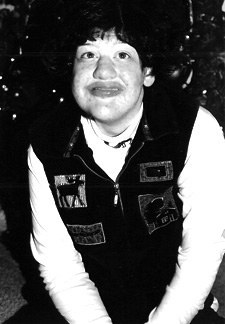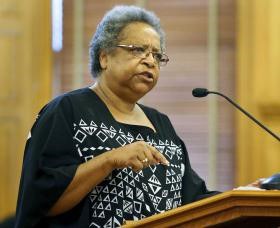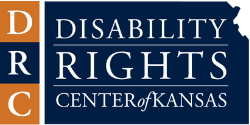Home and Community-Based Services
Magnolia's Story

Magnolia is an energetic, bubbly five-year-old. She loves to swim, adores her brother and waves at everyone she sees. She loves being around people. Magnolia was also diagnosed before birth with Wolf-Hirschhorn Syndrome, which is a condition caused by a missing part of the 4th chromosome and affects motor and verbal skills.
Magnolia started occupational therapy (OT) at age two. OT is a standard service to be covered through Medicaid. In fact, for children and youth under the age 21, federal law has special protections that ensure they receive basically most any health or long-term care that they need. The program is known as “EPSDT” – which stands for Early Periodic Screening Diagnostic and Treatment. In Kansas it is branded as the “KanBe Healthy” program. When Magnolia started OT four years ago, she could barely hold an object in her hand and had no grip or wrist movement. Thanks to OT, she can now open containers, help dress herself, turn pages of books and so much more.
In August 2015, her Managed Care Organization, called Sunflower, denied Magnolia 30 minutes of OT per week, acknowledging she was making progress, but stating she was not making enough progress and that “she might not get better with more therapy.” This was of course a ludicrous argument. EPSDT does not state that she has to be making “enough” progress to access OT. It simply must be medically necessary, which it clearly is.
Magnolia’s mom, Hilary, had enough of the bureaucratic run around from her MCO. She contacted DRC for legal representation. On October 1, 2105, DRC attorneys filed a request for an administrative hearing to seek to overturn Sunflower’s decision. DRC asserted that this denial violated federal law and that the OT was medically necessary. On May 30, 2016, the decision was reversed, and Sunflower was ordered to approve the requested OT services!
Magnolia continues to make huge strides because of the OT she is receiving. According to her mom, “She amazes us every single day! She is doing more at the age of 5 than I ever thought possible for her whole life! I truly see so much independence in her future because of OT.”
Mom & DRC Team up to Change Policy and Save Lives

Brooke Seager contacted the Disability Rights Center (DRC) of Kansas in 2004 because her daughter, Jessica, faced a health care crisis that threatened her health, independence, and even her life. Jessica is a person with epilepsy and a neurological disability that requires her to use an electronic device called a VNS (Vagus Nerve Stimulator) to prevent debilitating seizures and to allow her to live a life of dignity, respect, and independence. The VNS device is similar to a heart pacemaker in size and electronically stimulates the vagus nerve to prevent seizures. The vagus nerve is derived from the Latin word meaning “wandering.” Thus, the vagus nerve wanders from the brain stem through organs in the neck, thorax and abdomen.
When Jessica was under the age of 21 the Kansas Medicaid program paid for the VNS implant through the Early and Periodic Screening, Diagnostic, and Treatment (EPSDT) program, known in Kansas as Kan Be Healthy. EPSDT is a powerful part of the federal Medicaid law that requires the state to fund all necessary services for children and youth under 21. However, by the time Jessica was over the age of 21 she needed the batteries in her VNS unit replaced. Kansas Medicaid claimed that by policy it did not provide VNS treatment for adults over age 21. So, Kansas Medicaid refused to replace the batteries for the same unit it purchased and paid to surgically install just a few years earlier.
DRC believed this was terrible policy that lacked common sense. Most Medicaid programs in other states as well as private insurance programs cover this VNS treatment for persons of all ages. Without the replacement of these batteries, Jessica’s debilitating seizures would be uncontrollable and severely impact her daily functioning and quality of life.
Jessica’s mother, Brooke, came to DRC for help. Together they worked to educate the public and policy makers about this misguided policy. During hearings on the Medicaid budget in the Kansas Legislature, Brooke and DRC educated members of the House Social Services Budget Committee about the unreasonableness and idiocy of a policy that funds VNS implantation, but won’t replace the battery.
This policy advocacy, along with the support of several key legislators, caused Kansas Medicaid to make a formal review of their policy. As a result, Kansas Medicaid thankfully changed the policy and they now cover VNS battery replacements for situations like Jessica’s. Even bigger, Kansas also changed the policy to cover VNS devices in general, which was a positive change for all people with disabilities who need this life saving device. Jessica underwent her surgery to replace the batteries in her VNS on July 8, 2004, and Kansas Medicaid paid for the procedure. Jessica’s story is an example of the huge impact that a dedicated group of advocates can have when they stand up for what is right. This advocacy was able to change Medicaid policy to the benefit of all Kansans with disabilities.
“Jessica and I are so appreciative of the work of the House Appropriations Committee and the advocacy of DRC to obtain this critical surgery for Jessica,” Brooke Seager said.
DRC Helps Woman Stay in Community
Naomi Green suffered a severe anoxic brain injury while recovering from jaw surgery in June of 2010. An anoxic brain injury is when a brain injury is not a result from blunt force trauma to the head. The brain injury was so extremely severe that Naomi remained in a coma for several weeks. Because of the extent of the injury, she spent nearly nine months in a hospitals and rehabilitation facilities. Fortunately for Naomi, Kansas’s Physical Disability (PD) Waiver program provides Kansans the option to receive important services in their home. It is only with these in-home services that Naomi was able to leave the rehabilitation facility in Colorado and rejoin her family in Topeka in February of 2011.
Naomi’s case is an example of some of the drastic cuts to in-home services experienced by people with disabilities since Kansas privatized all of its Medicaid programs, including the in-home Waiver services received by Naomi. Since 2013, all of Medicaid in Kansas was privatized and given to three for-profit corporations. This new way of having large, publically-traded corporations operate the Medicaid program is called “KanCare.”
While Naomi continues to make progress and rehabilitate from her devastating injury, she is still nearly totally dependent on assistance to complete all of her activities of daily living. This need is expected to be lifelong.
Naomi’s caregivers, funded through the PD Waiver, assist her with everyday tasks such as feeding herself and personal hygiene. To help her regain some physical abilities, her caregivers also assist her with physical therapies each day. These therapies include range of motion exercises, joint compressions, and various exercises on a therapy mat and whirlpool water therapy. Even several years after the initial injury, these services are helping her regain some of the functions that she has lost.
In January of 2015 the KanCare managed care company that administers Naomi’s PD waiver services, Sunflower State Health Plan, proposed a massive reduction in her services. Naomi had been receiving 126 hours a week of attendant services. Sunflower wanted to decrease this amount to only 70 hours a week. Sunflower’s proposed service reduction would not have allowed Naomi to live safely in the community and would have forced Naomi to be admitted to a nursing home.
Johne (pronounced “Je-nae”) and Oliver Green, Naomi’s parents and co-guardians, contacted the Disability Rights Center seeking assistance in challenging Sunflower’s massive reduction of services.
A DRC attorney took the case drafted an appeal to Sunflower seeking to overturn its decision on February 20, 2015. On March 21, 2015, DRC received word that Sunflower had decided that Naomi was entitled to these services. The devastating cuts were restored!
Naomi’s mother, Johne, later testified about Sunflower’s actions at a KanCare hearing at the statehouse in front of members of the National Council on Disabilities (NCD). NCD was so concerned about managed care in Kansas that they came back a second time to hear concerns from the disability community. NCD was first in Kansas hearing about managed care problems in December of 2013. NCD is expected to issue a report regarding its finding.

Through direct legal representation by the DRC legal staff, Naomi continues to receive all of her needed services. Naomi was not forced into an expensive nursing home, which would have been terrible for Naomi, her family and Kansas taxpayers.
.png)





